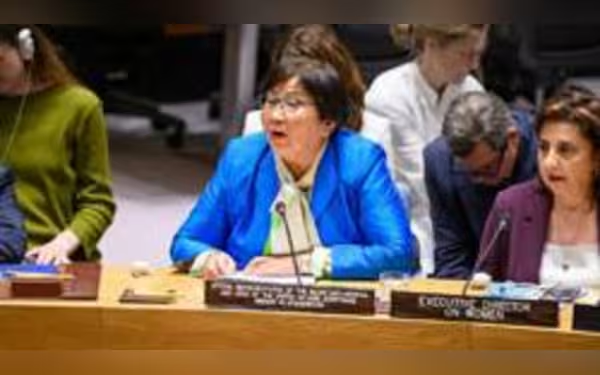Saturday, November 16, 2024 05:30 PM
UN Warns of Humanitarian Crisis in Afghanistan Under Taliban Rule
- Taliban's rule leads to severe restrictions on women's rights.
- Humanitarian response plan only 30% funded, worsening crisis.
- New laws impose oppressive restrictions on Afghan women and girls.
 Image Credits: nation_pk
Image Credits: nation_pkThe UN warns of a growing humanitarian crisis in Afghanistan under Taliban rule, highlighting severe restrictions on women's rights and urgent funding needs.
The situation in Afghanistan has become increasingly dire under the rule of the Taliban, raising serious concerns about the humanitarian rights of its citizens, particularly women. The United Nations has recently highlighted these issues, emphasizing the need for urgent international attention and action. Since the Taliban took control, they have enforced strict interpretations of Islamic law, which has led to significant restrictions on the rights and freedoms of the Afghan people.
During a recent meeting of the UN Security Council, Roza Otunbayeva, the Special Representative of the Secretary-General in Afghanistan, expressed that while the Taliban has brought a certain level of stability to the country, this has come at a steep price. The population is now facing a worsening humanitarian crisis, exacerbated by a decline in international funding. Otunbayeva pointed out that the current humanitarian response plan requires $3 billion, yet it is only 30 percent funded. This lack of financial support has resulted in the closure of over 200 healthcare services this year, with more expected to shut down soon.
Moreover, food rations for communities already struggling with hunger have been drastically reduced, and millions of vulnerable civilians lack access to safe drinking water. Otunbayeva warned that the humanitarian crisis is on the verge of becoming a development crisis, especially with Afghanistan's rapidly growing youth population. The economy is unable to support these young people, and international donors are hesitant to provide aid due to the Taliban's restrictions on half the population.
In a stark reminder of the challenges faced by women in Afghanistan, the UN Women Executive Director, Sima Bahous, detailed a new law that imposes severe restrictions on women and girls. This law mandates that they cover their bodies completely in public and prohibits them from speaking in public or looking at men who are not family members. Bahous emphasized that Afghan women live in constant fear of these oppressive laws and their unpredictable enforcement, stating, "A life lived in such circumstances is truly incomprehensible."
Education for girls has also been severely impacted, with only boys allowed to attend school under a curriculum controlled by the Taliban. A young Afghan girl named Mina, who now lives outside the country, voiced her concerns about the future of Afghan girls, fearing they will grow up believing they are unworthy of an education. She urged the international community to listen to the voices of Afghan girls and take action against their oppression.
UN Women and other advocates are calling for the 15-member Council to take decisive action to protect the rights of women and civilians in Afghanistan. Bahous implored the Council to commit to supporting Afghan women with renewed determination, stating, "We can decide now to put our political will and resources behind our solidarity with Afghan women."
The situation in Afghanistan serves as a stark reminder of the importance of human rights and the need for global solidarity in the face of oppression. As the international community watches, it is crucial to advocate for the rights of those who are silenced and to ensure that the voices of Afghan women and girls are heard. The future of an entire generation hangs in the balance, and it is our collective responsibility to act.













